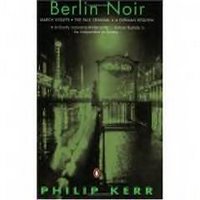
Yasmina Khadra is another pretty interesting guy -- yes, he's a man, despite the female name. (He's a former Algerian army officer who began writing under his wife's names to evade military censors and later fled to France in a self-imposed exile.) He's probably best known these days for novels that examine the causes and effects of terror and militant fundamentalism among ordinary people in the Middle East and North Africa:
The Swallows of Kabul,
The Attack,
In the Name of God and, coming next year in English translation,
The Sirens of Baghdad. Khadra has also published four crime novels about an honest and disillusioned Algiers police inspector oppressed by his city's squalor and surrounded by terror and corruption.
Double Blank, the second of the four, makes my list because -- stop me if you've heard this before -- it takes special advantage of its setting. Setting is everything here, in the physical, political, social and psychological senses. Squalor abounds. Uncertainty pervades all. Fear and corruption seep into characters' work, into their diets. In the first book of the series, they even invade the protagonist's sleep. So, how does Khadra's Inspector Brahim Llob survive? He's honest. He's compassionate, yet without illusions. He's wary of power, but he confronts the powerful when he has to. He has a dry sense of humor. He's a North African Philip Marlowe. (He's not quite that, though several reviewers have seen stylistic parallels with Chandler. Hammett is a pertinent comparison, too.
Double Blank's final pages are a distant echo of
The Maltese Falcon's.)
The first murder victim, whose grim fate I borrowed for the title of this post, is a senior diplomat. This is Algeria in the 1990s, so Islamic fundamentalists must be responsible, right? Llob is not so sure, and his investigation takes him in surprising directions. Not that Llob is sentimentally disposed toward Islamic fundamentalists. One such character is called "the Hairdresser" -- because he has a history of chopping off his victims' heads.
The novel's two dark forces -- murderous fundamentalism, and spectacular official corruption -- hover like specters above everything, and a third force creeps into play before the villain gets his in the end. Llob must work against and around all three, without illusions and with a grimly humorous attitude, to solve the crime. Here's Llob with a powerful figure in the government who has called him in for a secret assignment:
"I must admit, I'm taken by surprise. Why me?"
"Why not you?"
That's not good enough for me. After thirty years of hand-to-hand combat with disappointment, I'm certain that nothing in our country happens by coincidence.And here he is with a sleazy character, a possible small-time terrorist who has been evading him and withholding information:
I address Big Chief Standing Yak: "I've got an idea. Let's play Arabian Nights, okay? You be Scheherazade and I'll be the sultan. You can tell me all about your little pals, their hideouts, their plans. Ewegh, over there, he can be Damocles. If you stop talking, he'll hit you over the head until your brains start leaking out of your nostrils. If you survive, you earn a reprieve until tomorrow night. What do you think?"==============
For all its wisecracking,
Double Blank is a serious book. It is also elliptical, with shock chapter endings and days- or weeks-long leaps of time that leave out much of the detail one would find in a conventional police procedural. These two traits of the Llob novels account for a rather spectacular piece of literary snobbery in a blurb on
Double Blank's back cover from a Washington Post review of
Morituri, the first Llob novel:
"Khadra is often able to finesse the prosaic bits of information-gathering and interviews with suspects that hobble less intelligent mystery writers." (The highlighting is mine.)
May the odious prig who wrote that sentence spend an eternity of sleepless nights on a mattress filled with the collected works of Ed McBain.
© Peter Rozovsky 2006Labels: Africa, Algeria, Brahim Llob, Yasmina Khadra
"We Algerians react only to what happens to us, never to forestall something that might happen to us.







